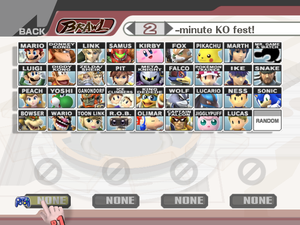Character selection screen
The character selection screen, also called the character selection menu and abbreviated as CSS, is the menu where a player chooses their character to be used in a game mode and also where the player may sometimes make changes to the rules. The character selection screen is composed of boxed portraits of the heads or busts of playable fighters, with more characters added once they are unlocked. It is utilized in each game and appears in both single player and multiplayer modes where the player is not required to use specific character(s). Character selection screens are almost always uniform across game modes for each game, with the exception of the character selection screen for Tournament Mode and the Subspace emissary single player mode in Brawl which uses a very featureless character selection screen for assembling a party of characters.
Character selection screen features
Each player controls a small hand cursor which carries an emblem displaying their control port number and color. Selecting a character involves carrying the emblem over the character portrait and pressing a selection button. A box at the bottom of the screen will usually change to reflect the character choice; in Super Smash Bros., a full model of the character will appear and strike a pose while in Melee and Brawl only a larger area of the character's portrait is shown.
Player character portraits after character selection are usually interactive. In Super Smash Bros. the color of the character's model will change in real time when cycling through palette swaps. The player can cycle through the palettes of each character in Brawl in an alternate way by pressing the selection button while hovering their hand cursor over the player character's portrait. Additionally in Brawl, the player can select the default form or starter character where applicable by using the cursor to highlight the form or character in the portrait. The only character that has a transformation that cannot be chosen by means of a character portrait is Samus. A player may also choose a name from an expandable box in Melee and Brawl.
Single player modes typically feature character selection screens with only one area for a player character portrait and a separate area where options for mode difficulty and/or a stock count until a continue is needed. There is typically an area that highlights highscores for that mode.
Multiplayer mode character select screens typically feature a way to change quickly between free-for-all or team battles and coin, stock, or time battles, as well as a way to quickly change simple parameters like stock amount and the time limit. Attempting to change the battle mode in Melee and Brawl accesses more advanced options by opening an option menu. Depending on the options and game mode set, additional parameters may be found in the character portrait, such as the sliding weight scale in Melee. Ways to activate computer players and adjust their difficulty are also found in the character portrait.
A Random icon appears for selection in Melee and Brawl, which randomly chooses a playable character. In Melee, this icon only appears once all characters are unlocked. In Melee's Tournament Mode, the Pokémon Ditto, while not selectable by usual means, replaces this function.
Once character selection and mode option requirements have been met, the game will give some kind of indication such a "Ready to fight!" banner. The player can proceed by selecting the banner or pressing the start button.
Trivia
- In multiplayer modes in Melee and Brawl, KO Stars appear in the player character portrait tallying the number of stocks taken off of other players.
- In Brawl, a unique sound effect will play if the player is using a Wii Remote while selecting a character.
- Super Smash Bros. is the only game to feature all portrait boxes for characters that have not been unlocked.
Gallery
A beta character selection screen in Melee.
A beta character selection screen in Melee. Zelda's portrait has been omitted.
A pre-release character selection screen in Super Smash Bros. for Wii U





